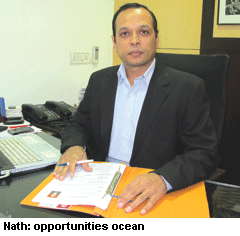Diverse career options are opening up in IPR registration, protection, and litigation. Careers in IPR law among other fields have emerged with law firms, legal outsourcing firms and business corporations on the lookout for specialised professionals
“Creativity and innovation are the new drivers of the world economy. Globalisation and rapid proliferation of technology have elevated the importance of intellectual property rights (IPR), especially for business enterprises anxious about protecting their inven-tions, brands and business processes. As India moves towards becoming a services outsourcing hub and know-ledge economy, IPR has become a critical component of business and industry. Little wonder that intellectual property rights is becoming an increasingly popular career choice,” observes Atulya Nath, co-founder and chief executive of the Global Institute of Intellectual Property (GIIP), a highly respected IPR training company with dual headquarters in New Delhi and San Jose, USA.
 The term intellectual property rights encompasses patents which confer rights over inventions; copyright which pertains to proprietory rights over original work; and trademarks of an organisation or an individual in business. The world over several million patents, copyright and trademarks are registered annually.
The term intellectual property rights encompasses patents which confer rights over inventions; copyright which pertains to proprietory rights over original work; and trademarks of an organisation or an individual in business. The world over several million patents, copyright and trademarks are registered annually.
Currently a mere 5,000-6,000 professionals including attorneys and patent agents are engaged in registering and protecting IPR in India. But with inventors, industry and businesses becoming aware of the critical value of IPR, the demand for experts in this and related fields is expected to rise to 25,000-30,000 in the next few years.
Diverse career options are opening up in IPR registration and protection, and litigation has also increased manifold. Consequently, a career in IPR law has emerged as a high-potential option with law firms, legal outsourcing firms and business corporations, increasingly on the lookout for specialised professionals.
Contrary to popular belief, a graduate in any discipline is eligible to write the trademarks law exam conducted by the registrar of trademarks and be regis-tered as a trademarks agent. On the other hand to qualify as a patent agent, a degree in science, engineering or technology from any university in India is a prerequisite. However, in-depth knowledge of IPR will make a huge difference in terms of employment quotient, especially for a fresher. Today there are dedicated study programmes available in IPR, and professionals who’ve pursued a specialisation or a super-specialisation have an edge over those without this qualification.
Several colleges offer IPR study programmes. Within IIT-Kharagpur, the Rajiv Gandhi School of Intellectual Property Law offers an LLB programme with specialisation in IPR and a postgraduate diploma in IPR law. Unsurprisingly, several law schools including the NLSIU, NALSAR, Amity Law School, IGNOU etc offer diploma programmes through distance educ-ation. The Confederation of Indian Industry offers its IPCAP certificate course, and the Global School of Intellectual Property (GIIP) dispenses a range of courses including a full-time nine-month postgrad diploma progr-amme in IPR and patent management to science, engineering, and technology graduates, as also law and business management graduates. GIIP also offers executive programmes in patent prot-ection, enforcement and management; a one-year postgrad diploma in patent law (distance learning) for technical/legal students and working profess-ionals; and short-term professional programmes.
“There’s an ocean of opportunities in IPR and related fields. As companies move from bricks-n-mortar to the knowledge economy, there will be a premium on IPR professionals, such as patent analysts, patent agents, IP consultants, valuation experts, portfolio managers etc. Our students are confr-onted with a wide range of employment options after completing professional programmes. Starting salaries are Rs.3-6 lakh per annum for graduates/postgraduates, while professionals with work experience command between Rs.8-12 lakh per annum,” says Nath, who co-founded GIIP in 2007 with Dr. Kailash Joshi, a former IBM professional.
A physics graduate of Hindu College, Delhi University with an MCA (Master of computer applications) from M.S. University, Baroda, Nath has 16 years of experience in the Indian IT industry, beginning his career in Nucleus Software Solutions, New Delhi, after which he promoted Skan Systems Solutions Pvt. Ltd in 1996, which merged with ASAP Solutions in 1998. He also co-founded ASAP Solutions Inc, USA and ASAP Solutions (S) Pte Ltd, Singapore (2000).
“Over the past four years giip has graduated more than 250 professionals from its postgrad diploma and certificate programmes, and has trained over 2,000 corporate executives with technical, legal and management backgrounds in IPR. Job options for IPR professionals are multiplying not only in the pharmaceutical, biotechnology and chemical industries, but also in other innovations driven industries such as electronics, IT, telecommunication, automobile and heavy engineering,” says Nath who opines that corporates in these industries urgently need to tap the services of IPR attorneys and patent agents to help them protect, enforce and manage their trademark and property rights.
Indra Gidwani (Mumbai)